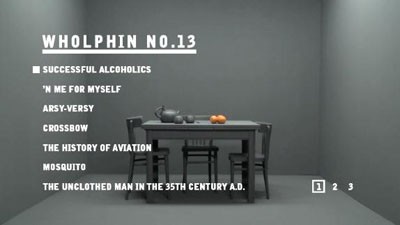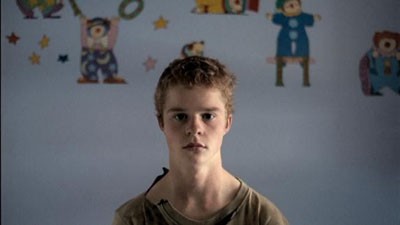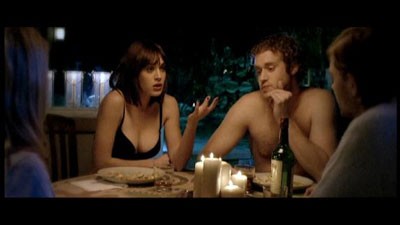| Reviews & Columns |
|
Reviews DVD TV on DVD Blu-ray 4K UHD International DVDs In Theaters Reviews by Studio Video Games Features Collector Series DVDs Easter Egg Database Interviews DVD Talk Radio Feature Articles Columns Anime Talk DVD Savant Horror DVDs The M.O.D. Squad Art House HD Talk Silent DVD
|
DVD Talk Forum |
|
|
| Resources |
|
DVD Price Search Customer Service #'s RCE Info Links |
|
Columns
|
|
|
Wholphin Issue 13
Unlucky number 13 brings and underwhelming line-up

Reviewer's Bias*
Loves: Wholphin, Good shorts, animation, beauty
Likes: DVD magazines, documentaries, out-there movies
Dislikes:
Hates: Bullying
The Story So Far...
Wholphin, part of the McSweeney's empire, releases a quarterly DVD magazine, which collects, as the subhead says, rare and unseen short films. The material ranges from old to recent and well-known to incredibly obscure, and as a result, the issues are an amazing gift for anyone open to unique entertainment. 12 issues have been released previously, and DVDTalk has reviews of all issues.
The Movies
How to Explain it to My Parents (Arno Coenen) (12:10/Menu Film)
Two men, one older and distinguished, one younger, bearded and casual, sit across from each other in a gray room with gray furniture (accented by a trio of bright oranges) and discuss beer and art. It's described by Wholphin as an "experimental documentary," but it may as well just be called a filmed, minimalist stage play as the very nature of art is debated, when a brewer views his beer as art. The look is good and the conversation is enjoyable, but it's not one of my favorite pieces from the Wholphin collection.
Delmer Builds a Machine (2:10/Menu Film)
This incredibly quick short helped me to realize it's very difficult to review many short films without ruining them for people who haven't seen them. There's such a small amount of content, that to talk about it too much would give everything away. Such is the case here, as we watch young Delmer building a machine out of stuff he's found, assisted by his teddy bear (who, like all good laborers sits around most of the time and takes lunch breaks.) In all good conscience, that's all I can say, because everything else that happens gives the film its punch. Suffice to say, it's amusing and adorable, while a touch shocking as well.

We Are the Faithful (9:00/Menu Film)
The nature of being a sports fan is so incredibly different when you compare America and Europe. Sure, American sports fans love to get drunk and scream and yell, but it's far more about being a spectator. In Europe, where this documentary was made (Switzerland specifically), being a sports fan is far more of a participatory sport in itself, with fans singing and chanting in choreographed splendor, becoming as much a part of the game as the players at times. To be honest, to this American hockey fan, the effort looks more like work than fun, but you can't argue with the atmosphere they create. The film focuses on a slim section of fans in a stadium during an FC Basel soccer game and the megaphone-wielding fan who leads them, putting you right in the midst of the fanaticism, and effectively shows a world foreign to North American sports fans (even the rowdy college sports crowds.)
Successful Alcoholics (25:10)
Written by Funny or Die alumni T.J. Miller and Jordan Vogt-Roberts, this story of a pair of relatively functional alcoholics dealing with how reality is impinging on their good times is alternatingly hilarious and pathetically sad. Though the tone of the film takes a dramatic shift near the end that nearly takes the movie off-road, the strength of the performances from an array of rising comedy stars, including Miller and Lizzy Kaplan (as well as cameos by Nick Kroll and Whitney Cummings) and a strong finish help make a solid overall short that benefits for this length. It would have been hard to spend a longer period with these characters, so they say their goodbyes at the right time.
'N Me For Myself (20:00)
From the first scene, this movie is obviously something different, as the lead male has no arms. The story is fully tied to this disability, as he and his girlfriend deal with work and personal issues that stem from his lack of limbs, but it thankfully doesn't linger on the physical, instead focusing on the psychological challenges. Though it's a pretty serious meditation on adapting to change (especially traumatic change) there's an undercurrent of dark humor that flows through (revealing itself through some hilarious wordplay.) As is often the case with shorts, this film handles a slice of life story quite well.
Arsy-Versy (23:24)
A documentary doesn't always have to have laser-sharp focus, especially if the world its subjects inhabit is an interesting one. That's definitely the case with this Slovakian doc, starring Lubos and his stereotypically Eastern-European mother Jolana (complete with a headscarf.) A grown man who lives with his elderly mom, Lubos is a genuine character, whose hobby, documenting bats, is something of an obsession, while he is a serious eccentric, the kind of guy you'd tell your children to stay away from if he lived down the street. The rigs he comes up with for tracking bats are fascinating though, and director Miro Remo does an excellent job of presenting it all with creativity, especially when it's revealed that Lubos has always been a bit of a nut, and a filmmaker when he was younger. One shot of a flashlight-armed Lubos coming down a tunnel is worth the price of admission.
Crossbow (14:50)
OK, Wholphin. I get it. Being an Australian kid sucks. Thankfully, Australian short-film makers are amazing, as they keep taking the same theme of Australian childhood and making excellent films, like this one. from director David Michôd, whose feature film Animal Kingdom turned heads. The use of a narrator really ratcheted up the tension on this one, while Michôd's voyeuristic camera drew me in to the dysfunctional family at the center of the film, in no small part due to the surprisingly sexy images of the matriarch of this trashy clan. As a result, I was unprepared for what was coming, and caught it like a wicked jab out of thin air. Between Wholphin and Not Quite Hollywood, my respect for Aussie cinema is higher than ever.
The History of Aviation (17:10)
A turn-of-the-century period piece, this is my least favorite short in this issue, largely because it meanders a bit too much for my tastes. There's a lot going on in a short amount of time, with a large picnic thrown asunder thanks to a missing little girl, and that little girl's world equally shattered by something she sees while lost. There's no doubt it has technical and artistic merit, reminding me, in a way, of the video for Vampire Weekend's "Oxford Comma," but the true star is the production value provided by shooting on the coast of Normandy in France. To be quite honest, I don't think the story is very important in the end. It's a very pretty picture that would probably be just as enjoyable with a gentle score than dialogue.
Mosquito (12:00)
Apparently Jeremy Engle decided to rise to the challenge of Australia's dominance in the category of "Short Films about Awful Adolescences," delivering the tale of yioung Cesar, a Dominican boy growing up in mid-'70s New York City, dealing with kids both his age and older who don't get him. Though not nearly as brutal as other films dealing with bullying, with most of the bullying coming in the form of the classic game of "butts up" and Ku Klux Klan attacks(?), Cesar's suffering is still hard to watch, even if the movie itself offers a picture-perfect recreation of the time period, both in the settings and performances, an achievement that Engle and his collaborators deserves heavy praise for.
The Unclothed Man in the 35th Century A,D, (7:40)
Getting an animated short (or in this case a collection of four animated episodes) in an episode of Wholphin is always a treat, as the curators have a deft hand at selecting cartoons for the collection. This is no exception. Created for IFC, this four-part animated trip from comic creator Dash Shaw follows Rebel X-6, a man pretending to be a Droid Model for a figure-drawing class, in order to infiltrate that world...for some reason that's not really explained. The artwork is chaotic and hand-drawn, featuring on-screen text and a touch of pixel-art thrown in to achieve a certain blend of style that really shows Shaw's alt-comic background, while the story feels like a stab at the computer-based art that's so prevalent today. Unlike some cartoons, it walks a tightrope between style and story without falling.

The DVD
Wholphin No. 13 returns with the same packaging as the previous 12, with the same cleanly-designed digipak as the other issues, with a tray on the left side and a 40-page booklet glued into the right inside panel, while a content breakdown is found on the back cover. The disc features animated menus (anamorphic widescreen) with a list of content, though it's not just an animated menu. What's in the background is the beginning of one of three menu shorts, which will play if you don't choose a film to watch. There are no audio options, no subtitles and no closed captioning.
The Quality
With films coming from 10 different directions, inequality in quality is to be expected, and itis the case. Some movies look amazing, some good great and some just look good. Nothing is particularly bad, but there are issues here and there, like the pixelated subtitles on We Are the Faithful and the hard to read subtitles (at times) on The History of Aviation. Overall though, there are no obvious issues with dirt or damage, nor are digital artifacts an issue.
The Dolby Digital 2.0 presentations on these films are good, delivering the sound without distortion or any other problems, but the offer nothing in terms of dynamic mixes, coming in as purely utilitarian.
The Extras
Once again, there are no extras on the disc, but, also once again, there's the excellent booklet, led by editor Brent Hoff's quarterly essay. You get interviews, artists statements and more, which is actually a lot better than some of the bonus material you see out there.

The Bottom Line
As the resident Wholphin cheerleader at DVDTalk, I'd love to say every issue is unmitigated genius worthy of trading your first-born for, but it's just not true, and this issue is not one of the best, despite the presence of quality films like Crossbow and Delmer Builds a Machine. Beyond those two entries, there justweren't films that grabbed me and made me want to watch them again. That said, even the "worst" film in this issue is worth a look, if only for its audacity or vision. It just goes to show that no DVD magazine about short films produced by the McSweeney people is perfect.
Francis Rizzo III is a native Long Islander, where he works in academia. In his spare time, he enjoys watching hockey, writing and spending time with his wife, daughter and puppy.Follow him on Twitter
*The Reviewer's Bias section is an attempt to help readers use the review to its best effect. By knowing where the reviewer's biases lie on the film's subject matter, one can read the review with the right mindset.
|
| Popular Reviews |
| Sponsored Links |
|
|
| Sponsored Links |
|
|
| Release List | Reviews | Shop | Newsletter | Forum | DVD Giveaways | Blu-Ray | Advertise |
|
Copyright 2024 DVDTalk.com All Rights Reserved. Legal Info, Privacy Policy, Terms of Use,
Manage Preferences,
Your Privacy Choices | |||||||














